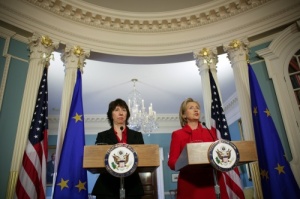By Peter Crail An April 27 Los Angeles Times story reports that "U.S. officials said they might agree to let Iran continue enriching uranium up to 5% purity, which is the upper end of the range for most civilian uses, if its government agrees to the unrestricted inspections, strict oversight and numerous safeguards that the United Nations has long demanded." The story says that the prospect for such an arrangement "would be a significant concession" on the part of the United States and "a shift in the U.S. position that Iran must halt all enrichment activities." The conclusions drawn by the L.A. Times misreads the history of the U.S. position and U.S. efforts to resolve the Iran nuclear issue with the P5+1. Although there has long been a preference on the part of the United States and many of its allies for zero enrichment in Iran (indeed, opposition to the spread of any uranium enrichment capability to any additional countries has been long-standing U.S. policy and an important nonproliferation principle), the potential to discuss with Iran the conditions under which it could continue enrichment is not new. In fact, it is built into the proposals that the P5+1 have offered Iran since 2006, spanning the George W. Bush and Barack Obama administrations. Then as now, the P5+1 require Iran to suspend uranium enrichment. The 2006 proposal, and it's 2008 update, include a review mechanism for that suspension to determine whether concerns over Iran's nuclear activities had been fully resolved, thereby meeting key conditions under which Iran could potentially resume enrichment. That proposal is still on the table. Such a review mechanism appears consistent with what a senior administration told the LA Times: "A senior administration official said that if Iran fulfills U.S. and other world powers' demands for strict enforcement of U.N. monitoring and safeguards, "there can be a discussion" of allowing low-level domestic enrichment, "and maybe we can get there, potentially." The shift by the Obama administration appears to be more a matter of its willingness to publicly state that there could be conditions under which Iran could maintain some enrichment capabilities, rather than a willingness to entertain the idea in the first place. In March 2011, Secretary Clinton told the House Foreign Affairs Committee regarding Iran's claimed right to enrichment, "it has been our position that under very strict conditions Iran would, sometime in the future, having responded to the international community's concerns and irreversibly shut down its nuclear weapons program, have such a right under IAEA inspections." As White House WMD Coordinator Gary Samore said in an Arms Control Today interview the following month: "What Secretary Clinton said has made explicit what has always been implicit in our policy, going back to the Bush administration, that if Iran were to satisfy the UN Security Council that its nuclear intentions were peaceful, then we would have no objection to Iran engaging in the full suite of peaceful nuclear activities." The most critical shift by the Obama administration was lifting the precondition that the United States would not hold talks with Iran as part of the P5+1 until Iran already carried out a key goal of those talks, suspending uranium enrichment. In doing so, Washington showed that it is far more committed to reaching a peaceful resolution to the nuclear file. While a negotiated solution in which Iran abandons enrichment would be ideal—Iran does not need to enrich uranium because it imports its nuclear fuel and enrichment capabilities should be consolidated rather than spread—there is no foreseeable peaceful resolution that does not entail potential Iranian enrichment. Allowing the perfect to be the enemy of the good could result in another regional conflict, an Iranian nuclear weapon, or both. The debate needs to shift to the steps Iran needs to take to prove its claims that it is not seeking and will not seek nuclear weapons to meet the conditions under which it could carry out its rights under the NPT.
“We continue to count on the valuable contributions of the Arms Control Association.”

